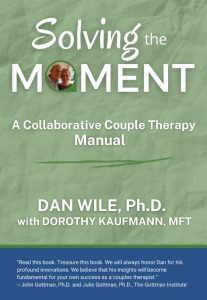In my previous newsletter, I described how I try to create intimate conversations by translating accusatory comments into confiding ones. Barry says to his wife, “Karen, can’t you stop dwelling on the past and move on?” I say, “Barry, I wonder if you’re feeling—and here I’ll be you talking to Karen—‘Karen, I’m so ashamed of what I put you through that I can’t stand thinking about it, much less talking about it.’”
My colleagues, Bernard Apfelbaum and Alan Domain, who commented on this newsletter, expressed concern that such interventions might be sugarcoating feelings, imposing an idealized conversation on the clients, and failing to uncover what was really happening in the relationship.
There is that danger. So I count on Barry to correct me if my guess is wrong. But suppose Barry is one of those clients who hesitates to correct his therapist? Won’t he say my guess is correct even if he doesn’t believe it is? Or suppose he doesn’t know what he feels or imagines that I, as the therapist, must know better than he. What if he is someone who hesitates to correct his therapist, is intimidated by the therapist’s authority, or is overly influenced by what his therapist says?
This is a problem.
Fortunately, clients typically give some sort of indication that I’ve translated their feelings incorrectly—I just need to read those signals. When my guess is wrong, they may qualify their response, saying I’m “mostly right,” “pretty close,” “generally correct,” “in the ballpark,” or “that’s a way of putting it”—which then allows me to say, “What would make it exactly right?” Or they say that my guess is right, but they do so in a stilted or lukewarm way—which gives me the chance to say, “That’s a half-hearted ‘yes.’ I don’t think I got it right.”
Even if clients say “yes” in a non-hesitant way, how can I be sure that they are not just being compliant and that their “yes” is genuine? I can tell if their whole body relaxes. Or they sigh in relief. Or their eyes well up with tears. Or their tone of voice softens. Or their face becomes alive. Or their sense of humor suddenly returns. When I suggest to Barry that he might feel bad about what he put Karen through, his body relaxes. He turns to Karen and says, pointing to me, “What he said.”
Barry has shifted from argument to conversation. Will Karen join him?
Karen (to Dan): That’s what you’re saying. It’s not what Barry’s saying. He doesn’t care.
I now try to capture Karen’s feelings.
Dan: Okay Karen, are you saying? “Barry, for the tiniest fraction of a second I thought that maybe what Dan said about you is right, but then I thought, ‘No, I can tell that you don’t really care about my feelings.’”
Karen (to Dan): You’re saying it too nice. That’s not me. That’s not what I feel.
Karen sees me as sugarcoating—as minimizing her anger. So I shift to Plan B and become spokesperson for her anger.
Dan: Oh, I got it wrong—all wrong. It’s more that you’re saying—‘Barry, you have no interest at all in trying to make up to me for all those horrible years you put me through. You’re just agreeing with Dan to cool me out. And you’ve obviously got him fooled, too.”
Karen (grunts): Yeah.
In my effort to get back in tune with Karen, I state her case more strongly than she has done. Having helped her state her position, I would then help Barry state his.
I’m trying to come up with the conversation that might solve, or at least ease, the couple’s immediate problem. Since my guesses can be off the mark, I try to make it easy for partners to correct me, unlike the old-style classic approach in which therapists put the weight of their authority behind their interventions. Among the various ways I do this is to:
- Let the partners know I’m unsure of my intervention, by either announcing I’m guessing (“this is pure speculation” or “I give myself about a 20 percent chance of being right”) or confiding specific concerns about the guess (“I’m afraid what I said may be too Pollyanna-ish”),
- Ask directly whether what I said matched their feelings and accept any corrections rather than argue my case or press my point,
- Pair my guess with an opposing alternative in the form of a how-much/how-much question: “How much do you agree with my suggestion that it’s hard for Barry to talk about the past because he feels so bad about what he put you through, and how much do you feel that we’re just making excuses for him?”
- Present multiple alternatives (a multiple-choice question) to make clear that I am not pushing a particular response. “Are you feeling (a) “she’s got a good point,” (b) “she’s making a mountain out of a molehill,” (c) “you don’t want to have to think about it,” or (d), something else entirely?
- Follow up on nonverbal cues (“That was a hesitant yes. I think I got it wrong”), and qualified answers (“You say my guess is 95 percent right. Tell me about the other 5 percent.”).
So there’s an important second part to Collaborative Couple Therapy. The first part is to ask questions and make guesses in an effort to uncover the needed conversation. The second part is to make it easy for partners to reject these guesses. The effect of making this easy is to empower the partners to correct the therapist’s wrong guesses, recognize the partners as sole judges of their reality, and appeal to the couple as co-creators of the conversation.



Thanks, Dan. The objection of your colleagues and your very smart response remind me of Dorothy Kaufmann’s epigraph from Sartre to her Sartre book: “We can know everything about our attachments except their force, that is their sincerity. Acts themselves cannot serve as a meaning-rod unless one has proved that they are not gestures, which is not always easy.” As someone who experiences such difficuly about my own speech acts some of the time, I do wonder how one separates speech “acts” and ‘gestures” in responding within the settings you describe: are your interventions, not to mention the speech acts of the clients, acts or gestures–or doesn’t it matter? Thanks again. Gerhard
When I asked Dorothy to explain Sartre’s distinction between “acts” and “gestures,” she said “acts” are a person’s true reactions (sincere feelings) and “gestures” are attempts to produce a particular effect on another person. When I doubled for Barry, I hoped to capture what he feels and make it easier for Karen to hear—that is, more accurately to capture his “acts” and, at the same time, produce the effect of a successful “gesture.” I didn’t accomplish the second purpose. Karen reacted negatively to my statement.
I just got the newsletter, and, as always, I feel good reading it. I greatly appreciate the options you offer, putting into words your deeply help view that understanding how the couple members really feel is a higher value than affirming your authority. Bravo. I will be using a lot of your words in my sessions this week, I feel sure.
My sense is that when we help clients reject our interventions we empower them to accept reality and give up on unreasonable expectations. Barry and Karen may be thinking spiteful thoughts, but what do they want to do about their reactivity? By either over or understating a possible position the therapist helps the client understand what’s really possible in the relationship. Stating hurt feelings is one thing, erasing them and the person who caused them is quite another. The other point I’d add is that pointing out nonverbal behavior (P.Ekman, F. Perls, et al.) is important here too. Did the couple stop holding hands when the intervention was made? Where did the eye contact go? What happened to body posture during this time?
What an interesting idea, Ric, that speaking for partners can inform them of the effect their comments have on their partners. If I overstate their heartfelt feelings or understate their anger, they might be able to see by contrast the effects of their accusatory statements.
I also appreciate that by our attempts to make an estimated statement for our clients, we can show a way of reaching for each other that doesn’t require having all of the information or knowing fully that it’s true. I seem to see this reaching for each other as a central aspect of your approach, Dan, and find that couples often need lots of examples and reminders of the variety of ways this can happen.
Your suggestions make a lot of sense, Dan. I like the humility you convey.I think it’s easier for Karen to accept Barry’s expression once you have accepted her defensiveness.
really like these changes about sharpening the criticism. Nice work
Yippee! I agreed with Bernard and Alan that you might be sugarcoating feelings. I’m so glad you’re dealing with that!